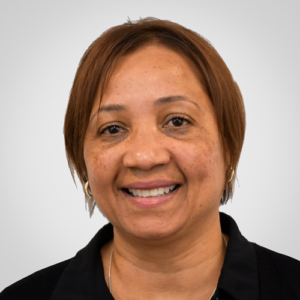Based in Worcester, MA, Damaris Diaz has over 20 years of experience in the healthcare industry. She’s a diligent worker and life-long learner, but her most defining characteristic is her genuine interest in helping people find the help they need. It’s this combination of traits that makes her such a great fit for our Compliance and Quality Improvement (QI) team. In this role, Damaris monitors the level of care that Spectrum provides, ensuring that our licensed medical professionals are properly credentialed through all the different health insurances for the important jobs they hold.
Ensuring the Optimal Standard of Care
 After growing up in Puerto Rico, Damaris moved to the United States where she first began taking ESL classes. “I’m bilingual: Spanish and English,” she said, before humbly adding, “and some Portuguese.” Having worked for several years in various areas of the healthcare industry, she joined Spectrum eight years ago, where she took on a role in the billing department. Eventually, she transferred to an administrative position, working directly for the CEO and COO, before finally joining the QI department in March 2022.
After growing up in Puerto Rico, Damaris moved to the United States where she first began taking ESL classes. “I’m bilingual: Spanish and English,” she said, before humbly adding, “and some Portuguese.” Having worked for several years in various areas of the healthcare industry, she joined Spectrum eight years ago, where she took on a role in the billing department. Eventually, she transferred to an administrative position, working directly for the CEO and COO, before finally joining the QI department in March 2022.
Damaris sees her QI work as being crucial to the substance use treatment services Spectrum provides. In this role, she works to ensure that Spectrum’s clinicians and healthcare professionals are all properly credentialed. By affirming their compliance with all required medical regulations, Damaris makes sure that each of Spectrum’s clients gets the level of care they deserve. “I’m still learning a lot,” she said. But for a perpetual student like Damaris, learning is nothing new.
More Than a Career
Throughout her career, Damaris has put countless hours into furthering her education. She earned two bachelor’s degrees: one in Communications and another in Criminal Justice, and later went on to earn a master’s in Healthcare Administration. Her extensive education and experience helped her pursue a gratifying career path, but as time went on, she also wanted to devote her energy to something more personal: helping others.
In 2020, Damaris began taking courses to become a certified substance abuse counselor (CADAC). She knew that there was a shortage of clinicians at the time—especially bilingual ones—and saw it as an opportunity to help members of Spanish-speaking communities attain long-term recovery.
That’s why, in addition to her work with the QI department, Damaris also works with Spectrum’s clients as a clinician in the Massachusetts Impaired Driver (MID), Prevention of Abuse and Violence Education (PAVE), Anger Management (AM) and Community Approach to Reduce Demand (CARD) programs. “I’m very passionate about what we do,” she said. It might seem like an overwhelming schedule to some, but Damaris insists it’s the least she could do. “In my point of view, what I do—especially with clients—is not because I need something. It’s because somebody else needs something.”
Driven by her devout belief in “second chances,” she is immensely gratified by her work as a substance abuse counselor. It allows her to foster personal relationships with those in recovery, guiding them as they commence their journey to a healthy future.
“At the end of the day you’re tired, but you know you’ve touched someone’s life.”
For more information about working at Spectrum Health Systems, visit the careers page on our website.


